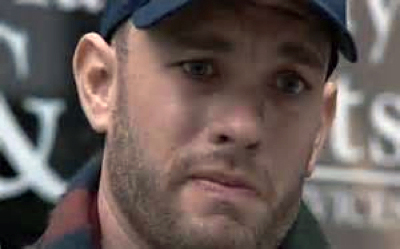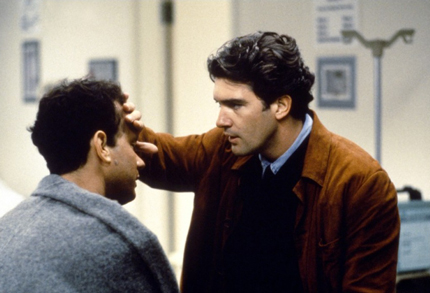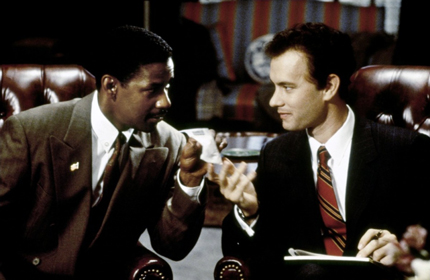
 |
|
|
|
Rising from the ranks of Roger Corman's New World Pictures, director Jonathan Demme made consistently well-reviewed movies through the 1980s -- Melvin and Howard, Something Wild, Married to the Mob, mixed in with an honorable misfire Swing Shift, some documentaries and a great performance movie or two --Swimming to Cambodia, Stop Making Sense. The success that stopped Demme from needing to prove anything was 1990's The Silence of the Lambs, a superlative horror tale that updated the chills of Psycho yet maintained a consistently humanist attitude. Silence coincided with the collapse of Orion Films, which had supported Demme's vision for ten years. He'd mostly return to documentaries, with one shining exception. 1993's Philadelphia is an overdue AIDS-related drama engineered to have a socially beneficial effect. A number of gay and HIV-themed dramas had pictured gay lifestyles and asked for sympathy and understanding. Demme and his screenwriter Ron Nyswaner apparently took on the project as a communications challenge: how to customize a movie on the issue to attract an audience uncomfortable with its subject? 1 
In 1993 most 'social problem' movies still followed the approach pioneered by Stanley Kramer. The producer and director of Inherit the Wind and Judgment at Nuremburg simply threw a melodramatic plot at an issue and made sure that the attractive stars were provided with highfalutin' speeches to tell the audience what to believe. I can't see Kramer making a success of Philadelphia, however. By the time of his smartly produced liberal issue film Guess Who's Coming to Dinner? a big part of the country was already committed to Civil Rights. But in 1993 Gay politics was still alien territory for a majority of Americans, and AIDS and HIV scared the hell out of everybody. Philadelphia is especially courageous in that it doesn't preach to the converted or lamely wail that things are unfair. It's carefully calculated to appeal to audiences predisposed against gay rights, or that think HIV and AIDS may be some kind of punishment for an evil lifestyle. What the film must do, as is repeated several times in its dialogue, is to "explain it to me like I'm a four-year-old." Rising success Andy Beckett (Tom Hanks) is awarded a high-priority, big-risk legal case at the law firm where he works. A brilliant attorney, he's probably only a step away from a partnership. A few weeks later Andy is trying to work from home, as the first symptoms of AIDS have caught up with him. He's been HIV-positive for quite a while and has told nobody. Despite the fact that only a month before the firm had the highest regard for Andy, the big boss Charles Wheeler (Jason Robards) unceremoniously fires him for incompetence, after an episode almost certainly set up as a pretext. Finding that nobody will take his wrongful termination case against the most powerful law office in the city, Andy hires ambulance chaser Joe Miller (Denzel Washington), who advertises on TV. At first repulsed by Andy's lifestyle and frightened by his disease (which can be communicated only by intimate means or a transfer of blood), Joe helps Andy build his case. Andy's mother Sarah (Joanne Woodward) and extended family back him up, and his life partner Miguel (Antonio Banderas) provides solid support as well. But Joe and Andy come up against stiff resistance in the courtroom, when the lead attorney Belinda Conine (Mary Steenburgen) mounts a flawless defense: in the firm's version of events, Andy is an incompetent looking for someone to pay his bills. Jonathan Demme's sincere movie is not too proud to adapt Stanley Kramer's old-school game plan, and he's not above having superstar performer Bruce Springsteen put his seal of approval on Philadelphia by singing a song in the opening title montage. Demme and his screenwriter Nyswaner stay away from depictions of the gay lifestyle that so disgust Charles Wheeler and his Old Boy's Club at the law office. Andy and his lover Miguel never get near a bed and have a devoted relationship that makes the majority of hetero marriages look dysfunctional. Andy has no real character flaws or crimes to his name and his extended family backs him up 100%. Money is also no problem. Andy gets red carpet care at a fully staffed hospital facility that can accommodate a dozen visitors at a time. As in older issue films, other factors are swept aside to concentrate viewer attention on Subject A. 
In the old formula, movie star appeal provides the power to breach the credibility gap. What male star at the time was more likeable than Tom Hanks? How many women would like to be the partner of Antonio Banderas -- heck, even Pedro Almodóvar used Banderas as Cute Bait in Women on the Verge of a Nervous Breakdown. The wildest that Philadelphia gets is a pointedly non-shocking gay costume party. Who says that Andy and Miguel wouldn't throw a party just like that ... their particular lifestyle alignment isn't extreme in any way. I have a feeling that plenty of politically minded gays were very aware that our hero Andy Beckett was confected as A Gay Straights Can't Object To. Which is exactly what was intended. Andy has obviously been discriminated against and the Old Boy lawyers are hypocrites (somewhat unrealistically) unaware of how vulnerable their position is. Much of the film's interest is in seeing the handsome, glad-handing TV lawyer Joe Miller move from a position of ignorant fear and suspicion to a place of understanding and justice. This of course is exactly the path the filmmakers want the audience to take. Denzel Washington, the '90s equivalent of Sidney Poitier, retreats from a handshake when he realizes Andy is HIV positive, and then rushes to a doctor to 'head off' what he fears may be a fatal exposure. Thus the movie gets in the key lessons about HIV transmissibility in a humorous way. As Miller comes from a position where gay jokes are the norm, the movie also uses him to get all the obvious smirking 'fun' out of its system. The movie's scripted transcendent scene, in which the very sick Andy communicates his emotional investment in a high opera aria about death and sacrifice, takes Miller all the way to true empathy. Touched and moved, Miller goes home and hugs his wife and child. Whether or not this works 100% for individual viewers, it works well enough to steer the audience a bit closer to a humanistic viewpoint. After that, the organized anti-gay mob outside the courtroom comes off as a pack of clueless, hateful morons. Jason Robards' Wheeler is the Bad Father figure, imprisoned by his narrow views. Taking point on the defense is Mary Steenburgen's almost frightening attorney, Belinda Conine, the kind of high-powered gunslinger that the best of the best would hire. Steenburgen twists her patented heartwarming smile into a lethal courtroom weapon that betrays no doubt and projects a powerful intimidation factor. Conine pulls no underhanded courtroom tricks. Her strength rests in fronting a deceitful version of events, and backing it up with her force of personality. Pushing things a bit is Washington's Miller. When the cut-rate TV Guy gets to the courtroom he becomes Clarence Darrow and Spencer Tracy, executing pirouettes of style that continually score points against the stuffy defense. As courtroom dramas go this is still high-grade stuff... it's just that one would think the defense might anticipate Miller's fancy moves, and have prepared traps for him. Again, because the film's real mandate is public education, Demme and Nyswaner keep things simple. 
Watching Andy's physical deterioration is an ordeal in itself; by the time of the trial he's beginning to weaken and become frail. The good news is that Philadelphia doesn't lose control in the courtroom. Andy doesn't come forth with any Frank Capra speeches, and when he collapses during a session the scene doesn't become a symbolic crucifixion. The assembled 'bad' executives pretty much show their cards from the beginning, betraying how deeply the subject of homosexuality affects them. Defender Joe Miller handles the case beautifully, purposely shocking the court with a barrage of gay slurs that Andy must deal with every day. Under Miller's cross examination Robards' Wheeler finally lets his prejudice out in the open, mentioning the Bible and squirming in the witness chair. Buying into Philadelphia's premise depends on whether one thinks that a movie is an appropriate conduit for advocacy propaganda. I think a rational person opposed to gays would still call Demme's movie a masterpiece of persuasive communication. I have a good comeback for those that claim that issue-oriented movies are made by a Hollywood elite that sways toward leftist ideology. in reality, the vast majority of commercial entertainment films shrink away from anything challenging, to pander the same cultural content that the bean counters say sold last year and will sell this year. That means that practically all movies are de facto propaganda for a conservative status quo. Philadelphia is honest and entertaining. It promotes positive human values without wallowing in sentiment. That's a worthy achievement. The Twilight Time Blu-ray of Philadelphia looks flawless. With its flying horse TriStar logo, this Columbia picture has a great look that wants to sell us on the City of Brotherly Love in more than one sense. (It still looks too damn cold for me.) The audio track is impeccable, and Twilight Time's Isolated Music Score allows us to acknowledge Howard Shore's supportive music. Fans of Jonathan Demme will recognize most of the names in the credits, starting with cinematographer Tak Fujimoto; on screen we see good bits from Demme vets Ron Vawter, Paul Lazar, Tracey Walter, Charles Napier, Roger Corman and Kenneth Utt. The amiable commentary sees Demme and Nyswaner's discussing how they secured the film's many collaborators. They enjoy talking about the music and give a good accounting of their goals. The original making-of featurette is a glossy EPK package that says the expected things. Some video coverage of the courthouse protest scene has the spark of reality, while a gallery of deleted scenes show that little was removed from the film. But one excised bit does have Banderas and Hanks in bed together. A trailer is included as well. Julie Kirgo's insert pamphlet liner notes nail the film's importance precisely and zero in on the performance highlights that won Tom Hanks his Oscar. 2
On a scale of Excellent, Good, Fair, and Poor,
Philadelphia Blu-ray rates:
Footnotes:
1. It took 30 years for the story of Harvey Milk to be made into a dramatic movie, and I'll bet the prospect of seeing Milk bill and coo and exchange gay familiarities and kisses with his partner still hurt that very good movie's marketability. Philadelphia couldn't afford to be so open and honest.
2. There are of course those that would say that the role of Andy Beckett was ironclad Oscar bait. The Academy's idea of what constitutes a 'daring, challenging' performance can be embarrassing. I've not forgotten a cynical joke from 1995's Get Shorty, where somebody spots an actor on Sunset Blvd. and says, "Didn't he play the crippled gay guy who climbed Mount Everest?"
Reviews on the Savant main site have additional credits information and are often updated and annotated with reader input and graphics. Also, don't forget the 2011 Savant Wish List. T'was Ever Thus.
Review Staff | About DVD Talk | Newsletter Subscribe | Join DVD Talk Forum |
| ||||||||||||||||||